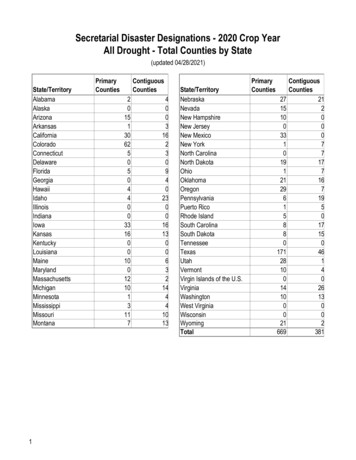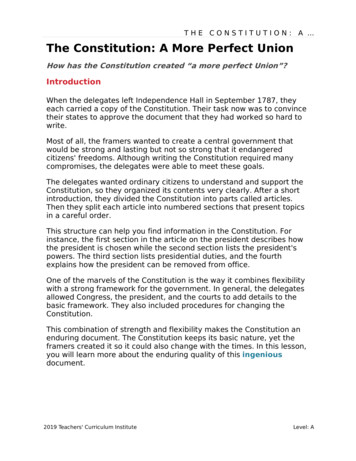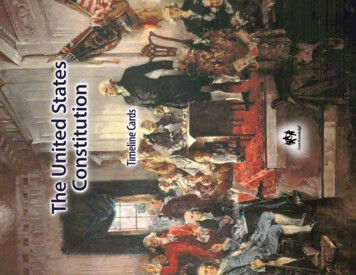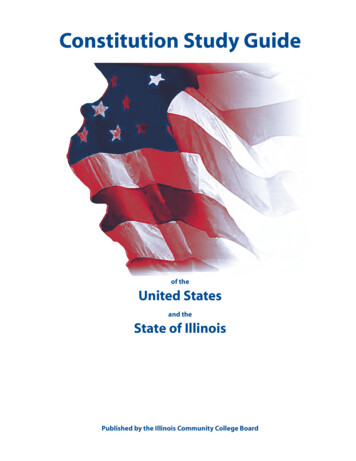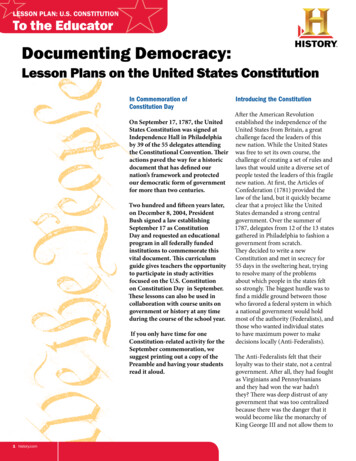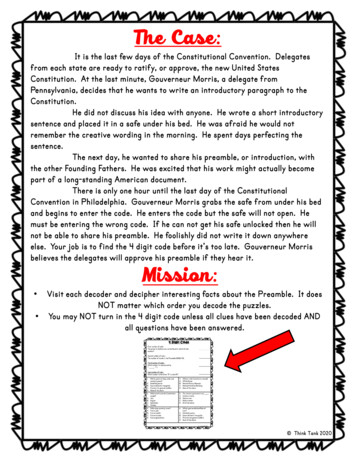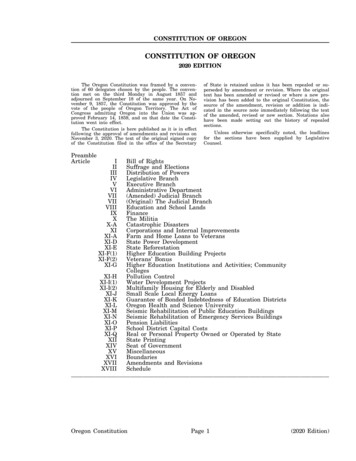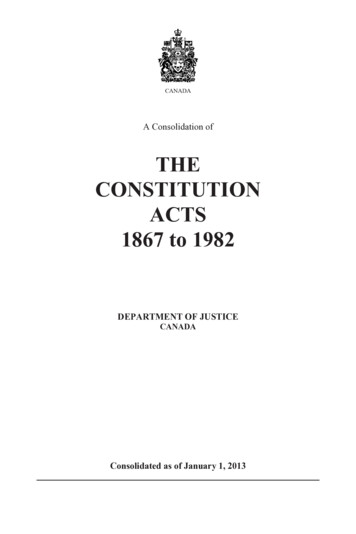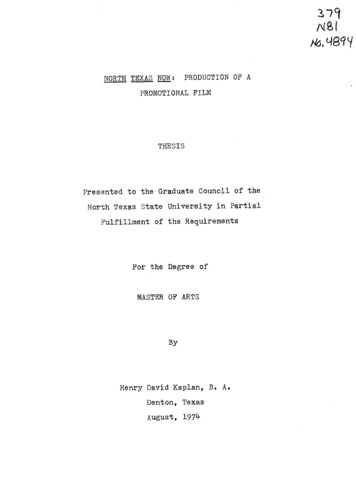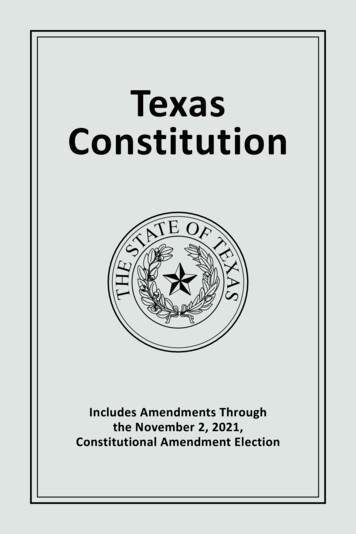
Transcription
T E OFATX ASTETHE STexasConstitutionIncludes Amendments Throughthe November 2, 2021,Constitutional Amendment Election
TexasConstitutionIncludes Amendments Throughthe November 2, 2021,Constitutional Amendment ElectionPrepared by the Legal Divisionof theTexas Legislative CouncilPublished by theTexas Legislative Council
Texas Legislative CouncilLieutenant Governor Dan Patrick, Joint ChairSpeaker Dade Phelan, Joint ChairJeff Archer, Executive DirectorThe mission of the Texas Legislative Council isto provide professional, nonpartisan service and supportto the Texas Legislature and legislative agencies.In every area of responsibility,we strive for quality and efficiency.The headings to the individual sections of the Texas Constitution are, with a fewexceptions, unofficial and have been added for the convenience of the reader. TheTexas Legislative Council revised many of the section headings in 2017 and continuesto include descriptive headings as sections are added or amended.Copies of this publication have been distributed in compliance with the statedepository law (Subchapter G, Chapter 441, Government Code), and are availablefor public use through the Texas State Publications Depository Program at the TexasState Library and other state depository libraries. This publication can be found l copies of this publication may be obtained from the council:By mail: P.O. Box 12128, Austin, TX 78711-2128By phone: (512) 463-1144By e-mail: house.documentdistribution@tlc.texas.govBy online request form (legislative offices only): https://bilreq/House.aspx
CONSTITUTIONOF THESTATE OF TEXASAdopted February 15, III.XIV.XV.XVI.XVII.PageNote on UELMA Compliance. . . . . . . . . . . . . . . . . . . . . . . . . . . . . . . vPreamble. . . . . . . . . . . . . . . . . . . . . . . . . . . . . . . . . . . . . . . . . . . . . . . 1Bill of Rights . . . . . . . . . . . . . . . . . . . . . . . . . . . . . . . . . . . . . . . . . . . . 1The Powers of Government. . . . . . . . . . . . . . . . . . . . . . . . . . . . . . . . 9Legislative Department . . . . . . . . . . . . . . . . . . . . . . . . . . . . . . . . . . 10Executive Department. . . . . . . . . . . . . . . . . . . . . . . . . . . . . . . . . . . 76Judicial Department. . . . . . . . . . . . . . . . . . . . . . . . . . . . . . . . . . . . . 84Suffrage. . . . . . . . . . . . . . . . . . . . . . . . . . . . . . . . . . . . . . . . . . . . . . 100Education . . . . . . . . . . . . . . . . . . . . . . . . . . . . . . . . . . . . . . . . . . . . 102Taxation and Revenue . . . . . . . . . . . . . . . . . . . . . . . . . . . . . . . . . . 121Counties . . . . . . . . . . . . . . . . . . . . . . . . . . . . . . . . . . . . . . . . . . . . . 145Railroads. . . . . . . . . . . . . . . . . . . . . . . . . . . . . . . . . . . . . . . . . . . . . 155Municipal Corporations. . . . . . . . . . . . . . . . . . . . . . . . . . . . . . . . . 156Private Corporations . . . . . . . . . . . . . . . . . . . . . . . . . . . . . . . . . . . 160Spanish and Mexican Land Titles(Repealed Aug. 5, 1969.). . . . . . . . . . . . . . . . . . . . . . . . . . . . . . . . 161Public Lands and Land Office. . . . . . . . . . . . . . . . . . . . . . . . . . . . . 162Impeachment. . . . . . . . . . . . . . . . . . . . . . . . . . . . . . . . . . . . . . . . . 163General Provisions. . . . . . . . . . . . . . . . . . . . . . . . . . . . . . . . . . . . . 165Mode of Amending the Constitutionof This State . . . . . . . . . . . . . . . . . . . . . . . . . . . . . . . . . . . . . . . . . . 202Appendix: Notes on Temporary Provisions forAdopted Amendments. . . . . . . . . . . . . . . . . . . . . . . . . . . . . . . . . . 203Index. . . . . . . . . . . . . . . . . . . . . . . . . . . . . . . . . . . . . . . . . . . . . . . . 209
This page intentionally left blank.
NOTE ON UELMA COMPLIANCEThe Texas Legislative Council maintains the official text of the TexasConstitution on the TCAS website at https://statutes.capitol.texas.gov. Theconstitutional provisions found on TCAS comply with the Uniform ElectronicLegal Material Act (UELMA). For more information about UELMA, please see thecouncil’s implementation report at https://tlc.texas.gov/publications.v
This page intentionally left blank.
Art. I Sec. 1PREAMBLEHumbly invoking the blessings of Almighty God, the people of the State ofTexas, do ordain and establish this Constitution.ARTICLE IBILL OF RIGHTSThat the general, great and essential principles of liberty and free governmentmay be recognized and established, we declare:Sec. 1. FREEDOM AND SOVEREIGNTY OF STATE. Texas is a free andindependent State, subject only to the Constitution of the United States, andthe maintenance of our free institutions and the perpetuity of the Union dependupon the preservation of the right of local self‑government, unimpaired to allthe States. (Feb. 15, 1876.)Sec. 2. I N H E R E N T P O L I T I C A L P OW E R; R E P U B L I C A N FO R M O FGOVERNMENT. All political power is inherent in the people, and all freegovernments are founded on their authority, and instituted for their benefit. Thefaith of the people of Texas stands pledged to the preservation of a republicanform of government, and, subject to this limitation only, they have at all timesthe inalienable right to alter, reform or abolish their government in such manneras they may think expedient. (Feb. 15, 1876.)Sec. 3. EQUAL RIGHTS. All freemen*, when they form a social compact, haveequal rights, and no man, or set of men, is entitled to exclusive separate publicemoluments, or privileges, but in consideration of public services. (Feb. 15, 1876.)Sec. 3a. EQUALITY UNDER THE LAW. Equality under the law shall not bedenied or abridged because of sex, race, color, creed, or national origin. Thisamendment is self‑operative. (Added Nov. 7, 1972.)Sec. 4. RELIGIOUS TESTS. No religious test shall ever be required as aqualification to any office, or public trust, in this State; nor shall any one beexcluded from holding office on account of his religious sentiments, providedhe acknowledge the existence of a Supreme Being. (Feb. 15, 1876.)Sec. 5. WITNESSES NOT DISQUALIFIED BY RELIGIOUS BELIEFS; OATHSAND AFFIRMATIONS. No person shall be disqualified to give evidence in anyof the Courts of this State on account of his religious opinions, or for the wantof any religious belief, but all oaths or affirmations shall be administered in themode most binding upon the conscience, and shall be taken subject to the painsand penalties of perjury. (Feb. 15, 1876.)Sec. 6. FREEDOM OF WORSHIP. All men have a natural and indefeasibleright to worship Almighty God according to the dictates of their own consciences.No man shall be compelled to attend, erect or support any place of worship, orto maintain any ministry against his consent. No human authority ought, in anycase whatever, to control or interfere with the rights of conscience in matters* The language of this provision is identical to the language of the official legislative measurethat originally proposed the provision.1
Art. I Sec. 6-aof religion, and no preference shall ever be given by law to any religious societyor mode of worship. But it shall be the duty of the Legislature to pass such lawsas may be necessary to protect equally every religious denomination in thepeaceable enjoyment of its own mode of public worship. (Feb. 15, 1876.)Sec. 6-a. RELIGIOUS SERVICE PROTECTIONS. This state or a politicalsubdivision of this state may not enact, adopt, or issue a statute, order,proclamation, decision, or rule that prohibits or limits religious services, includingreligious services conducted in churches, congregations, and places of worship,in this state by a religious organization established to support and serve thepropagation of a sincerely held religious belief. (Added Nov. 2, 2021.)Sec. 7. APPROPRIATIONS FOR SECTARIAN PURPOSES. No money shall beappropriated, or drawn from the Treasury for the benefit of any sect, or religioussociety, theological or religious seminary; nor shall property belonging to theState be appropriated for any such purposes. (Feb. 15, 1876.)Sec. 8. FREEDOM OF SPEECH AND PRESS; LIBEL. Every person shall be atliberty to speak, write or publish his opinions on any subject, being responsiblefor the abuse of that privilege; and no law shall ever be passed curtailing theliberty of speech or of the press. In prosecutions for the publication of papers,investigating the conduct of officers, or men in public capacity, or when thematter published is proper for public information, the truth thereof may begiven in evidence. And in all indictments for libels, the jury shall have the rightto determine the law and the facts, under the direction of the Court, as in othercases. (Feb. 15, 1876.)Sec. 9. SEARCHES AND SEIZURES. The people shall be secure in theirpersons, houses, papers and possessions, from all unreasonable seizures orsearches, and no warrant to search any place, or to seize any person or thing,shall issue without describing them as near as may be, nor without probablecause, supported by oath or affirmation. (Feb. 15, 1876.)Sec. 10. RIGHTS OF ACCUSED IN CRIMINAL PROSECUTIONS. In allcriminal prosecutions the accused shall hav* a speedy public trial by an impartialjury. He shall have the right to demand the nature and cause of the accusationagainst him, and to have a copy thereof. He shall not be compelled to giveevidence against himself* and shall have the right of being heard by himself orcounsel, or both, shall be confronted by the witnesses against him and shall havecompulsory process for obtaining witnesses in his favor, except that when thewitness resides out of the State and the offense charged is a violation of any ofthe anti‑trust laws of this State, the defendant and the State shall have the rightto produce and have the evidence admitted by deposition, under such rules andlaws as the Legislature may hereafter provide; and no person shall be held toanswer for a criminal offense.* unless on an indictment of a grand jury, exceptin cases in which the punishment is by fine or imprisonment, otherwise thanin the penetentiary*, in cases of impeachment, and in cases arising in the army* The language of this provision is identical to the language of the official legislative measurethat originally proposed the provision.2
Art. I Sec. 11or navy, or in the militia, when in actual service in time of war or public danger.(Feb. 15, 1876. Amended Nov. 5, 1918.)Sec. 11. BAIL. All prisoners shall be bailable by sufficient sureties, unlessfor capital offences*, when the proof is evident; but this provision shall not beso construed as to prevent bail after indictment found upon examination of theevidence, in such manner as may be prescribed by law. (Feb. 15, 1876.)Sec. 11a. DENIAL OF BAIL AFTER MULTIPLE FELONIES. (a) Any person (1)accused of a felony less than capital in this State, who has been theretoforetwice convicted of a felony, the second conviction being subsequent to the first,both in point of time of commission of the offense and conviction therefor, (2)accused of a felony less than capital in this State, committed while on bail fora prior felony for which he has been indicted, (3) accused of a felony less thancapital in this State involving the use of a deadly weapon after being convictedof a prior felony, or (4) accused of a violent or sexual offense committed whileunder the supervision of a criminal justice agency of the State or a politicalsubdivision of the State for a prior felony, after a hearing, and upon evidencesubstantially showing the guilt of the accused of the offense in (1) or (3) above,of the offense committed while on bail in (2) above, or of the offense in (4)above committed while under the supervision of a criminal justice agency of theState or a political subdivision of the State for a prior felony, may be denied bailpending trial, by a district judge in this State, if said order denying bail pendingtrial is issued within seven calendar days subsequent to the time of incarcerationof the accused; provided, however, that if the accused is not accorded a trialupon the accusation under (1) or (3) above, the accusation and indictment usedunder (2) above, or the accusation or indictment used under (4) above withinsixty (60) days from the time of his incarceration upon the accusation, the orderdenying bail shall be automatically set aside, unless a continuance is obtainedupon the motion or request of the accused; provided, further, that the right ofappeal to the Court of Criminal Appeals of this State is expressly accorded theaccused for a review of any judgment or order made hereunder, and said appealshall be given preference by the Court of Criminal Appeals.(b) In this section:(1) “Violent offense” means:(A) murder;(B) aggravated assault, if the accused used or exhibited a deadly weaponduring the commission of the assault;(C) aggravated kidnapping; or(D) aggravated robbery.(2) “Sexual offense” means:(A) aggravated sexual assault;(B) sexual assault; or* The language of this provision is identical to the language of the official legislative measurethat originally proposed the provision.3
Art. I Sec. 11b(C) indecency with a child. (Added Nov. 6, 1956; amended Nov. 8, 1977;Subsec. (a) amended and (b) added Nov. 2, 1993.)Sec. 11b. DENIAL OF BAIL FOR VIOLATION OF CONDITION OF RELEASE.Any person who is accused in this state of a felony or an offense involving familyviolence, who is released on bail pending trial, and whose bail is subsequentlyrevoked or forfeited for a violation of a condition of release may be denied bailpending trial if a judge or magistrate in this state determines by a preponderanceof the evidence at a subsequent hearing that the person violated a condition ofrelease related to the safety of a victim of the alleged offense or to the safety ofthe community. (Added Nov. 8, 2005; amended Nov. 6, 2007.)Sec. 11c. DENIAL OF BAIL FOR VIOLATION OF PROTECTIVE ORDERINVOLVING FAMILY VIOLENCE. The legislature by general law may providethat any person who violates an order for emergency protection issued by ajudge or magistrate after an arrest for an offense involving family violence orwho violates an active protective order rendered by a court in a family violencecase, including a temporary ex parte order that has been served on the person,or who engages in conduct that constitutes an offense involving the violationof an order described by this section may be taken into custody and, pendingtrial or other court proceedings, denied release on bail if following a hearing ajudge or magistrate in this state determines by a preponderance of the evidencethat the person violated the order or engaged in the conduct constituting theoffense. (Added Nov. 6, 2007.)Sec. 12. HABEAS CORPUS. The writ of Habeas Corpus is a writ of right, andshall never be suspended. The Legislature shall enact laws to render the remedyspeedy and effectual. (Feb. 15, 1876.)Sec. 13. EXCESSIVE BAIL OR FINES; CRUEL OR UNUSUAL PUNISHMENT;OPEN COURTS; REMEDY BY DUE COURSE OF LAW. Excessive bail shall notbe required, nor excessive fines imposed, nor cruel or unusual punishmentinflicted. All courts shall be open, and every person for an injury done him, inhis lands, goods, person or reputation, shall have remedy by due course of law.(Feb. 15, 1876.)Sec. 14. DOUBLE JEOPARDY. No person, for the same offence*, shall betwice put in jeopardy of life or liberty,* nor shall a person be again put upontrial for the same offence,* after a verdict of not guilty in a court of competentjurisdiction. (Feb. 15, 1876.)Sec. 15. RIGHT OF TRIAL BY JURY. The right of trial by jury shall remaininviolate. The Legislature shall pass such laws as may be needed to regulate thesame, and to maintain its purity and efficiency. Provided, that the Legislaturemay provide for the temporary commitment, for observation and/or treatment,of mentally ill persons not charged with a criminal offense, for a period oftime not to exceed ninety (90) days, by order of the County Court withoutthe necessity of a trial by jury. (Feb. 15, 1876. Amended Aug. 24, 1935.)* The language of this provision is identical to the language of the official legislative measurethat originally proposed the provision.4
Art. I Sec. 15‑aSec. 15‑a. COMMITMENT OF PERSONS OF UNSOUND MIND. No personshall be committed as a person of unsound mind except on competent medicalor psychiatric testimony. The Legislature may enact all laws necessary to providefor the trial, adjudication of insanity and commitment of persons of unsoundmind and to provide for a method of appeal from judgments rendered in suchcases. Such laws may provide for a waiver of trial by jury, in cases where theperson under inquiry has not been charged with the commission of a criminaloffense, by the concurrence of the person under inquiry, or his next of kin, andan attorney ad litem appointed by a judge of either the County or Probate Courtof the county where the trial is being held, and shall provide for a method ofservice of notice of such trial upon the person under inquiry and of his right todemand a trial by jury. (Added Nov. 6, 1956.)Sec. 16. BILLS OF ATTAINDER; EX POST FACTO OR RETROACTIVE LAWS;IMPAIRING OBLIGATION OF CONTRACTS. No bill of attainder, ex post factolaw, retroactive law, or any law impairing the obligation of contracts, shall bemade. (Feb. 15, 1876.)Sec. 17. TAKING PROPERTY FOR PUBLIC USE; SPECIAL PRIVILEGES ANDIMMUNITIES; CONTROL OF PRIVILEGES AND FRANCHISES. (a) No person’sproperty shall be taken, damaged, or destroyed for or applied to public usewithout adequate compensation being made, unless by the consent of suchperson, and only if the taking, damage, or destruction is for:(1) the ownership, use, and enjoyment of the property, notwithstandingan incidental use, by:(A) the State, a political subdivision of the State, or the public at large; or(B) an entity granted the power of eminent domain under law; or(2) the elimination of urban blight on a particular parcel of property.(b) In this section, “public use” does not include the taking of propertyunder Subsection (a) of this section for transfer to a private entity for the primarypurpose of economic development or enhancement of tax revenues.(c) On or after January 1, 2010, the legislature may enact a general, local,or special law granting the power of eminent domain to an entity only on a twothirds vote of all the members elected to each house.(d) When a person’s property is taken under Subsection (a) of this section,except for the use of the State, compensation as described by Subsection (a)shall be first made, or secured by a deposit of money; and no irrevocable oruncontrollable grant of special privileges or immunities shall be made; but allprivileges and franchises granted by the Legislature, or created under its authority,shall be subject to the control thereof. (Feb. 15, 1876. Amended Nov. 3, 2009.)Sec. 18. IMPRISONMENT FOR DEBT. No person shall ever be imprisonedfor debt. (Feb. 15, 1876.)Sec. 19. DEPRIVATION OF LIFE, LIBERTY, PROPERTY, ETC. BY DUE COURSEOF LAW. No citizen of this State shall be deprived of life, liberty, property,privileges or immunities, or in any manner disfranchised, except by the duecourse of the law of the land. (Feb. 15, 1876.)5
Art. I Sec. 20Sec. 20. OUTLAWRY OR TRANSPORTATION OUT OF STATE FOR OFFENSE.No citizen shall be outlawed. No person shall be transported out of the Statefor any offense committed within the same. This section does not prohibit anagreement with another state providing for the confinement of inmates of thisState in the penal or correctional facilities of that state. (Feb. 15, 1876. AmendedNov. 5, 1985.)Sec. 21. CORRUPTION OF BLOOD; FORFEITURE OF ESTATE; SUICIDES.No conviction shall work corruption of blood, or forfeiture of estate, and theestates of those who destroy their own lives shall descend or vest as in case ofnatural death. (Feb. 15, 1876.)Sec. 22. TREASON AGAINST STATE. Treason against the State shall consistonly in levying war against it, or adhering to its enemies, giving them aid andcomfort; and no person shall be convicted of treason except on the testimonyof two witnesses to the same overt act, or on confession in open court.(Feb. 15, 1876.)Sec. 23. RIGHT TO KEEP AND BEAR ARMS. Every citizen shall have theright to keep and bear arms in the lawful defence* of himself or the State; butthe Legislature shall have power, by law, to regulate the wearing of arms, witha view to prevent crime. (Feb. 15, 1876.)Sec. 24. MILITARY SUBORDINATE TO CIVIL AUTHORITY. The military shallat all times be subordinate to the civil authority. (Feb. 15, 1876.)Sec. 25. QUARTERING SOLDIERS IN HOUSES. No soldier shall in time ofpeace be quartered in the house of any citizen without the consent of the owner,nor in time of war but in a manner prescribed by law. (Feb. 15, 1876.)Sec. 26. PERPETUITIES AND MONOPOLIES; PRIMOGENITURE ORENTAILMENTS. Perpetuities and monopolies are contrary to the genius of a freegovernment, and shall never be allowed, nor shall the law of primogeniture orentailments ever be in force in this State. (Feb. 15, 1876.)Sec. 27. RIGHT OF ASSEMBLY; PETITION FOR REDRESS OF GRIEVANCES.The citizens shall have the right, in a peaceable manner, to assemble together fortheir common good; and apply to those invested with the powers of governmentfor redress of grievances or other purposes, by petition, address or remonstrance.(Feb. 15, 1876.)Sec. 28. SUSPENSION OF LAWS. No power of suspending laws in this Stateshall be exercised except by the Legislature. (Feb. 15, 1876.)Sec. 29. BILL OF RIGHTS EXCEPTED FROM POWERS OF GOVERNMENTAND INVIOLATE. To guard against transgressions of the high powers hereindelegated, we declare that every thing in this “Bill of Rights” is excepted out ofthe general powers of government, and shall forever remain inviolate, and all lawscontrary thereto, or to the following provisions, shall be void. (Feb. 15, 1876.)* The language of this provision is identical to the language of the official legislative measurethat originally proposed the provision.6
Art. I Sec. 30Sec. 30. RIGHTS OF CRIME VICTIMS. (a) A crime victim has the followingrights:(1) the right to be treated with fairness and with respect for the victim’sdignity and privacy throughout the criminal justice process; and(2) the right to be reasonably protected from the accused throughout thecriminal justice process.(b) On the request of a crime victim, the crime victim has the followingrights:(1) the right to notification of court proceedings;(2) the right to be present at all public court proceedings related to theoffense, unless the victim is to testify and the court determines that the victim’stestimony would be materially affected if the victim hears other testimony atthe trial;(3) the right to confer with a representative of the prosecutor’s office;(4) the right to restitution; and(5) the right to information about the conviction, sentence, imprisonment,and release of the accused.(c) The legislature may enact laws to define the term “victim” and to enforcethese and other rights of crime victims.(d) The state, through its prosecuting attorney, has the right to enforce therights of crime victims.(e) The legislature may enact laws to provide that a judge, attorney forthe state, peace officer, or law enforcement agency is not liable for a failure orinability to provide a right enumerated in this section. The failure or inability ofany person to provide a right or service enumerated in this section may not beused by a defendant in a criminal case as a ground for appeal or post‑convictionwrit of habeas corpus. A victim or guardian or legal representative of a victimhas standing to enforce the rights enumerated in this section but does not havestanding to participate as a party in a criminal proceeding or to contest thedisposition of any charge. (Added Nov. 7, 1989.)Sec. 31. FUNDS FOR COMPENSATION TO VICTIMS OF CRIME. (a) Thecompensation to victims of crime fund created by general law and thecompensation to victims of crime auxiliary fund created by general law are eacha separate dedicated account in the general revenue fund.(b) Except as provided by Subsection (c) of this section and subject tolegislative appropriation, money deposited to the credit of the compensation tovictims of crime fund or the compensation to victims of crime auxiliary fund fromany source may be expended as provided by law only for delivering or fundingvictim‑related compensation, services, or assistance.(c) The legislature may provide by law that money in the compensationto victims of crime fund or in the compensation to victims of crime auxiliaryfund may be expended for the purpose of assisting victims of episodes of mass7
Art. I Sec. 32violence if other money appropriated for emergency assistance is depleted.(Added Nov. 4, 1997.)Sec. 32. MARRIAGE. (a) Marriage in this state shall consist only of the unionof one man and one woman.(b) This state or a political subdivision of this state may not create orrecognize any legal status identical or similar to marriage. (Added Nov. 8, 2005.)Sec. 33. PUBLIC ACCESS TO AND USE OF PUBLIC BEACHES. (a) In thissection, “public beach” means a state-owned beach bordering on the seawardshore of the Gulf of Mexico, extending from mean low tide to the landwardboundary of state-owned submerged land, and any larger area extending fromthe line of mean low tide to the line of vegetation bordering on the Gulf of Mexicoto which the public has acquired a right of use or easement to or over the areaby prescription or dedication or has established and retained a right by virtueof continuous right in the public under Texas common law.(b) The public, individually and collectively, has an unrestricted right to useand a right of ingress to and egress from a public beach. The right granted bythis subsection is dedicated as a permanent easement in favor of the public.(c) The legislature may enact laws to protect the right of the public toaccess and use a public beach and to protect the public beach easement frominterference and encroachments.(d) This section does not create a private right of enforcement. (AddedNov. 3, 2009.)Sec. 34. RIGHT TO HUNT, FISH, AND HARVEST WILDLIFE. (a) The peoplehave the right to hunt, fish, and harvest wildlife, including by the use of traditionalmethods, subject to laws or regulations to conserve and manage wildlife andpreserve the future of hunting and fishing.(b) Hunting and fishing are preferred methods of managing and controllingwildlife.(c) This section does not affect any provision of law relating to trespass,property rights, or eminent domain.(d) This section does not affect the power of the legislature to authorize amunicipality to regulate the discharge of a weapon in a populated area in theinterest of public safety. (Added Nov. 3, 2015.)Sec. 35. RIGHT OF CERTAIN FACILITY RESIDENTS TO DESIGNATEESSENTIAL CAREGIVER. (a) A resident of a nursing facility, assisted living facility,intermediate care facility for individuals with an intellectual disability, residenceproviding home and community-based services, or state supported living center,as those terms are defined by general law, has the right to designate an essentialcaregiver with whom the facility, residence, or center may not prohibit in-personvisitation.(b) Notwithstanding Subsection (a) of this section, the legislature by generallaw may provide guidelines for a facility, residence, or center described bySubsection (a) of this section to follow in establishing essential caregiver visitationpolicies and procedures. (Added Nov. 2, 2021.)8
Art. II Sec. 1ARTICLE IITHE POWERS OF GOVERNMENTSec. 1. SEPARATION OF POWERS OF GOVERNMENT AMONG THREEDEPARTMENTS. The powers of the Government of the State of Texas shall bedivided into three distinct departments, each of which shall be confided to aseparate body of magistracy, to wit: those which are Legislative to one,* thosewhich are Executive to another, and those which are Judicial to another; and noperson, or collection of persons, being of one of these departments, shall exerciseany power properly attached to either of the others, except in the instancesherein expressly permitted. (Feb. 15, 1876.)* The language of this provision is identical to the language of the official legislative measurethat originally proposed the provision.9
Art. III Sec. 1ARTICLE IIILEGISLATIVE DEPARTMENTSec. 1. SENATE AND HOUSE OF REPRESENTATIVES. The Legislative powerof this State shall be vested in a Senate and House of Representatives, whichtogether shall be styled “The Legislature of the State of Texas.” (Feb. 15, 1876.)Sec. 2. MEMBERSHIP OF SENATE AND HOUSE OF REPRESENTATIVES.The Senate shall consist of thirty‑one members. The House of Representativesshall consist of 150 members. (Feb. 15, 1876. Amended Nov. 2, 1999.) (Temporarytransition provisions for Sec. 2: see Appendix, Note 1.)Sec. 3. ELECTION AND TERM OF OFFICE OF SENATORS. The Senators shallbe chosen by the qualified voters for the term of four years; but a new Senateshall be chosen after every apportionment, and the Senators elected after eachapportionment shall be divided by lot into two classes. The seats of the Senatorsof the first class shall be vacated at the expiration of the first two years, andthose of the second class at the expiration of four years, so that one half of theSenators shall be chosen biennially thereafter. Senators shall take office followingtheir election, on the day set by law for the convening of the Regular Sessionof the Legislature, and shall serve thereafter for the full term of years to whichelected. (Feb. 15, 1876. Amended Nov. 8, 1966, and Nov. 2, 1999.) (Temporarytransition provisions for Sec. 3: see Appendix, Note 1.)Sec. 4. E L E C T I O N A N D T E R M O F M E M B E R S O F H O U S E
The headings to the individual sections of the Texas Constitution are, with a few exceptions, unofficial and have been added for the convenience of the reader. The Texas Legislative Council revised many of the section headings in 2017 and continues to inclu
